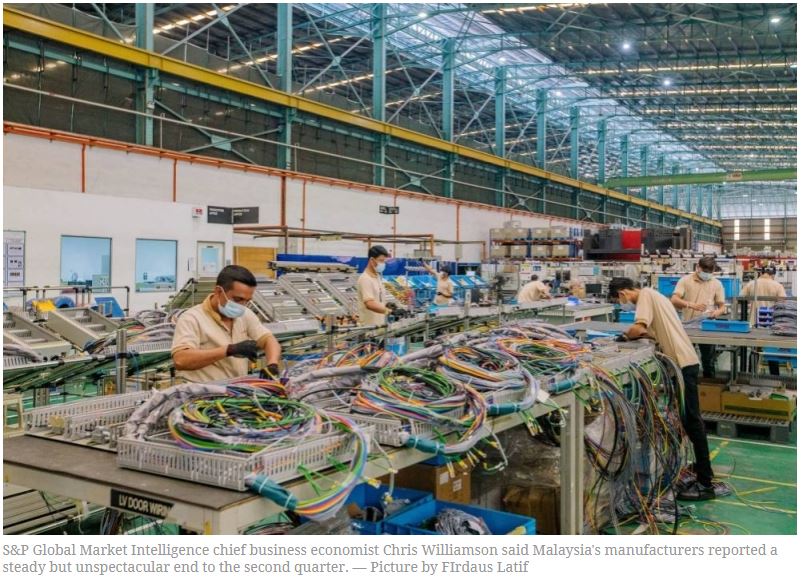Malaysia’s PMI up in June, signalling improvement in manufacturing sector
KUALA LUMPUR, July 1 — The seasonally adjusted S&P Global Malaysia Manufacturing Purchasing Managers’ Index (PMI) registered 50.4 in June, up from 50.1 in May, signalling a slightly stronger, yet still modest, improvement in the manufacturing sector.
The Malaysian manufacturing sector saw overall operating conditions improve at a slightly quicker rate halfway through 2022 and production levels stabilised for the first time following five consecutive monthly declines, while new orders rose for the third month running, albeit only fractionally.
S&P Global Market Intelligence chief business economist Chris Williamson said Malaysia’s manufacturers reported a steady but unspectacular end to the second quarter, underscoring how the economic recovery has lost some steam compared to the start of the quarter.
“Companies are reporting sluggish export sales and growing concerns over the rising cost of living, especially in terms of rising energy and fuel prices.
“Both input costs and average selling prices are rising sharply again, suggesting inflationary pressures continue to build,” he said in a research note today.
He also said that while there was good news in terms of some supply constraints showing clear signs of easing which should help alleviate some industrial price pressures, global energy and food supply have become increasing sources of concern.
Meanwhile, the Asean manufacturing sector recorded an improvement in operating conditions during June, according to the latest PMI data.
Growth in output and new orders quickened compared to the previous survey period. However, manufacturing firms also reported renewed contractions in buying activity and employment.
The headline PMI registered 52.0 in June, down slightly from 52.3 in May, to signal a solid overall improvement in the health of the Asean manufacturing sector.
Meanwhile, growth eased for the second month running, to the second-softest in the current nine-month sequence of expansion.
Six of the seven Asean nations signalled growth during June, with Singapore leading the rankings table for the seventh month running. Moreover, the rate of improvement (59.3) was marked and accelerated to a new series high.
Commenting on the Asean Manufacturing PMI data, economist, Maryam Baluch said the latest PMI data signalled a further loss in growth momentum across the Asean manufacturing sector.
“Firms, despite increasing production levels and receiving higher volumes of new orders, cut back on headcounts, holdings of raw materials and semi-finished items in June.
“Growth slowed in four of the seven monitored nations in June while Myanmar recorded a decline. Surging inflation, raw material shortages and energy price hikes, impacted each region in one way or another,” she said in a separate statement.
She added that nevertheless, sentiment was positive across the Asean manufacturing sector with panellists hopeful that output would expand in the coming 12 months. — Bernama


 Thailand
Thailand




